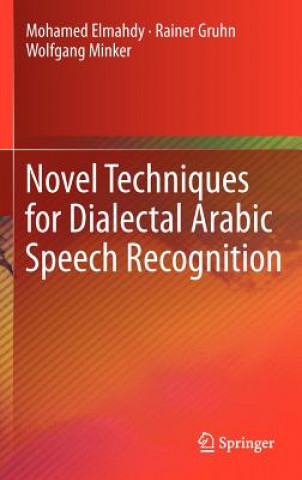
Doručení
Nákupní rádce





Nehodí se? Vůbec nevadí! U nás můžete do 30 dní vrátit
 Dárkový poukaz
V libovolné hodnotě
Dárkový poukaz
V libovolné hodnotě
S dárkovým poukazem nešlápnete vedle. Obdarovaný si za dárkový poukaz může vybrat cokoliv z naší nabídky.
Novel Techniques for Dialectal Arabic Speech Recognition
 Angličtina
Angličtina
 290 b
290 b
30 dní na vrácení zboží


Novel Techniques for Dialectal Arabic Speech Recognition describes novel approaches to improve automatic speech recognition for dialectal Arabic. Since speech resources for dialectal Arabic speech recognition are very sparse, the authors describe how existing Modern Standard Arabic (MSA) speech data can be applied to dialectal Arabic speech recognition, while assuming that MSA is always a second language for all Arabic speakers, and in most cases the original dialect of a speaker can be identified even though he is speaking MSA. Hence, an acoustic model trained with sufficient number of MSA speakers from different origins will implicitly model the acoustic features for the different Arabic dialects. In this case, it can be called dialect-independent acoustic modeling. §In this book, Egyptian Colloquial Arabic (ECA) has been chosen as a typical Arabic dialect. ECA is the first ranked Arabic dialect in terms of number of speakers. A high quality ECA speech corpus with accurate phonetic transcription has been collected. MSA acoustic models were trained using news broadcast speech. Usually, MSA and dialectal Arabic do not share the same phoneme set. Therefore, in order to crosslingually use MSA in dialectal Arabic speech recognition, the authors have normalized the phoneme sets for MSA and ECA. After this normalization, they have applied state-of-the-art acoustic model adaptation techniques like Maximum Likelihood Linear Regression (MLLR) and Maximum A-Posteriori (MAP) to adapt existing phonemic MSA acoustic models with a small amount of dialectal ECA speech data. Speech recognition results indicate a significant increase in recognition accuracy compared to a baseline model trained with only ECA data.
Informace o knize
 Angličtina
Angličtina
Kategorie




 Jak nakupovat
Jak nakupovat















